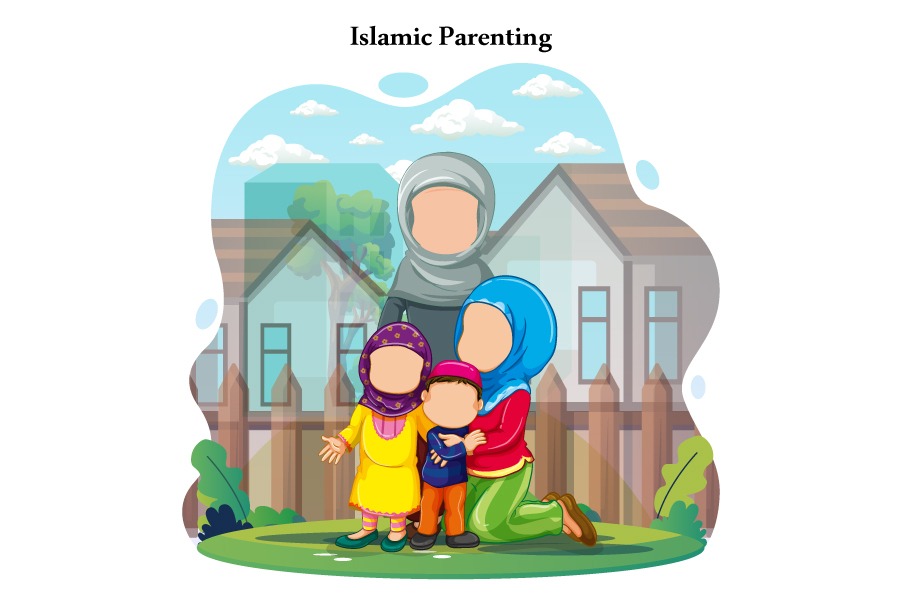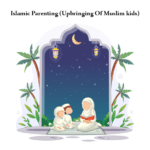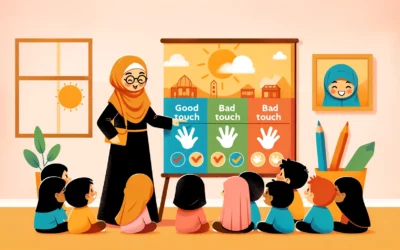Islamic Parenting: Nurturing Faith and Virtue
In the intricate tapestry of life, parenting holds a thread of utmost importance, colored with responsibility, patience, and unending love. In Islam, this thread is also interwoven with faith, creating a vibrant picture of holistic upbringing. Islamic parenting is not merely a set of rules; it’s a heart-filled journey undertaken by Muslim parents, especially mothers, to nurture their children into responsible, virtuous individuals familiar with Allah, Prophet Muhammad PBUH and basic Islamic rules.
The Essence of Islamic Parenting
Islamic parenting is a comprehensive and lifelong journey that extends far beyond fulfilling a child’s basic needs. It involves nurturing a child’s spiritual, emotional, and moral growth from the earliest days of life and throughout their journey to adulthood. This sacred path demands a profound comprehension of the fundamental Islamic principles and values that should serve as the guiding light for a child’s development. It’s not merely about feeding, clothing, and providing shelter; it’s about instilling a profound understanding of faith and morality that will shape a child’s character and actions for a lifetime. Et’s get into a comprehensive Parenting guide for Muslim moms in Newyork.
Understanding the Role of a Muslim Mom in NY
The role of a Muslim mother is pivotal in shaping the child’s faith and character. She is not just a nurturer but also a teacher, a role model, and the first exposure her child has to the principles of Islam. How she practices her faith, exhibits patience, and showers kindness leaves lasting imprints on the tender hearts and minds of her children.
5 Essential Tips for Muslim MOMS!
In Islam, the journey of parenting is both a personal and community effort. Mothers, as primary caregivers, play a crucial role in guiding their children on the path of Islam. They have various ways to ensure their child’s spiritual and moral growth, including personal interactions, community involvement, education, and participation in religious gatherings. This approach emphasizes the importance of individual and collective efforts in raising children with strong faith and virtuous character.
Establishing a Foundation of Faith
Nurturing a child’s spirituality is the very foundation of Islamic parenting. This involves instilling in children a deep love for Allah and a profound connection with the teachings of the Prophet Muhammad (PBUH). To achieve this, parents should weave these spiritual elements into their children’s daily lives. For instance, parents might share bedtime stories from Islamic history that demonstrate the Prophet’s character and values.
They can also engage children in regular acts of worship, like reciting Quranic verses or engaging in age-appropriate supplications. By making these spiritual practices a central part of a child’s life, parents provide them with a strong moral compass and a deep sense of connection to their faith.
Daily Prayers: The Heartbeat of Islamic Life
Introducing the practice of daily prayers to children from a young age is a pivotal aspect of Islamic parenting. It extends beyond being a mere ritual; it’s a precious moment when a child establishes a personal connection with their Creator. As a mother, setting an example by regularly engaging in prayer underscores the importance of this spiritual act and invites the child to participate.
Praying together creates a rhythmic and comforting reminder of faith’s central role in their everyday life. For instance, a mother can make the act of Wudu (ablution) an engaging experience for her child, explaining its significance and involving them in the process. This hands-on approach helps children comprehend the beauty of prayer as a conversation with Allah and reinforces its importance as a daily anchor of their faith.
The Quran: Instilling Divine Guidance
Incorporating the words of the Quran into a child’s daily life is a fundamental aspect of Islamic parenting. The Quran’s divine wisdom serves as an unwavering guiding light for children, especially in a world filled with constant distractions and noise. To make this happen, parents can create a routine of listening to Quranic recitations together with their children. By doing this, they create a tranquil and spiritually enriching environment where the child can absorb the Quranic verses’ beauty and wisdom.
Furthermore, parents can engage their children in discussions about the stories and moral lessons found in the Quran. For instance, sharing the story of Prophet Yunus (Jonah) and the significance of patience and repentance can provide valuable life lessons. These conversations deepen a child’s understanding of their faith and demonstrate how the Quran’s teachings are relevant to their everyday lives. By establishing this connection with the Quran, parents provide their children with a powerful source of guidance and a profound understanding of their faith’s principles.
Moral Virtues: Building Character
Islamic parenting places significant emphasis on nurturing moral virtues in children. It goes beyond merely instructing them on what is permissible (halal) and what is forbidden (haram) in Islam. More importantly, it involves instilling in them the fundamental qualities that characterize a devout Muslim.
For example, parents can focus on teaching children essential virtues such as honesty, kindness, patience, and humility. They can illustrate the importance of truthfulness by sharing stories of honest individuals from Islamic history. Demonstrating kindness through acts of charity or helping neighbors in need can leave a lasting impression on a child’s heart.
Moreover, parents can guide their children on how to be patient during challenging times, reinforcing the belief that Allah rewards patience. Emphasizing humility by showing respect and gratitude towards others highlights the essence of being a good Muslim. By imparting these moral virtues, parents shape their children into individuals who know their faith and live it through their actions and character.
Compassion and Kindness: The Prophetic Example
Prophet Muhammad (PBUH) is the ultimate embodiment of kindness and compassion in Islamic history. An effective approach in Islamic parenting is encouraging children to emulate his noble examples in their interactions with family, friends, and even pets. It’s a gentle reminder that children often learn and adopt behavior by imitation.
For instance, parents can share stories of the Prophet’s kindness to animals, emphasizing the importance of treating all living beings with care and respect. They can instill the habit of saying “Bismillah” before eating, reminding children of the Prophet’s gratitude to Allah for the blessings of food. Encouraging children to visit and assist the elderly in the community mirrors the Prophet’s respect for elders and his emphasis on companionship.
By drawing inspiration from the Prophet’s life, parents not only guide their children to better behavior but also instill a profound understanding of the core principles of Islam – kindness, compassion, and gratitude.
Honesty and Integrity: Pillars of Strong Faith
Imparting the value of honesty to children is a cornerstone of Islamic parenting. It goes beyond just teaching them the importance of truthfulness; it instills the belief that integrity is a treasure more valuable than gold. An effective strategy is to lead by example, demonstrating honesty in all aspects of life.
For instance, parents can encourage their children to admit their mistakes and take responsibility for their actions. When children witness their parents admitting their own faults, it reinforces the principle of honesty. Additionally, engaging in open and truthful conversations with children, even about challenging topics, fosters an environment of trust and candor.
Furthermore, parents can narrate stories from Islamic history that highlight the significance of honesty. For example, the story of Prophet Yusuf (Joseph) and his unwavering honesty in the face of adversity can be a powerful example.
By consistently emphasizing the value of honesty and exemplifying it in their own lives, parents nurture this virtuous quality in their children and instill a profound understanding of its significance in Islam.
Education and Knowledge
Within the framework of Islamic beliefs, the pursuit of knowledge holds a sacred and fundamental role. Islamic parenting, therefore, places great emphasis on the duty of seeking knowledge. This duty extends beyond mere academic subjects and includes a comprehensive approach to education.
Parents are encouraged to ensure their children receive well-rounded knowledge, encompassing not only the sciences and humanities but also their religion. This holistic approach aims to equip children with a deep understanding of their faith, allowing them to navigate life with strong moral and ethical foundations.
For example, parents can encourage their children to read the Quran and understand its meanings. They can engage in discussions about Islamic history and the lives of prominent scholars and thinkers. This broadens their knowledge and instills a sense of pride in their Islamic heritage.
A core aspect of Islamic parenting is incorporating religious education into a child’s learning journey. By fostering a love for knowledge and a thirst for both worldly and spiritual wisdom, parents enable their children to develop into well-rounded individuals who understand the importance of their faith in the broader context of their lives.
Seeking Knowledge: A Lifelong Journey
Nurturing a genuine love for learning in children is a vital aspect of Islamic parenting. Parents should foster an environment where curiosity is celebrated and a hunger for knowledge is actively encouraged. Prophet Muhammad (PBUH) set a powerful example by emphasizing the pursuit of knowledge throughout one’s life.
To implement this, parents can engage their children in activities that spark their curiosity, such as visiting museums or science centers, reading books, or conducting simple scientific experiments at home. By doing so, they demonstrate that learning is not confined to formal education but is a lifelong endeavor.
Moreover, sharing stories of the Prophet’s unwavering commitment to learning can inspire children. For instance, the Hadith about seeking knowledge from the cradle to the grave is a compelling example.
By instilling a passion for learning, parents empower their children to approach education with enthusiasm and a deep appreciation for the value of knowledge. This love for learning becomes a lifelong asset, guiding them toward continuous self-improvement and spiritual growth.
Balancing Worldly and Religious Education
In the realm of Islamic parenting, striking a balance between academic accomplishments and religious education is of paramount importance. While academic achievements are certainly valuable, they should be complemented by a strong foundation in one’s faith. To achieve this balance, it’s crucial to ensure that children comprehensively understand their deen (religion).
Religious education should encompass a deep exploration of the seerah (the life of Prophet Muhammad), the hadith (sayings and actions of the Prophet), and the Sirah (Islamic history). These invaluable teachings provide children with the ethical and spiritual guidance they need to navigate life’s myriad challenges and successes.
Parents can make religious education engaging and enjoyable, for instance, by narrating the stories of the Prophet’s life or discussing the wisdom found in his sayings. This ensures that religious knowledge isn’t a burden but a source of inspiration.
Ultimately, by maintaining this balance, parents equip their children with the academic and spiritual tools they need to thrive in both their lives’ material and moral aspects. This well-rounded education molds them into individuals who are not only knowledgeable but also deeply connected to their faith.
Community Involvement
The concept of Ummah is powerful in Islam. Being part of a community not only provides a sense of belonging but also opportunities to practice the principles of Islam.
The Ummah: Extended Family of Faith
Involve your children in community activities. Let them feel the joy of being part of something bigger, understanding the diversity and unity that exists within the Muslim Ummah.
Charity and Service: Living the Faith
Encourage acts of charity and service. Teach them that every act of kindness is a step closer to Allah. Whether it’s sharing food, volunteering, or a simple smile, it’s all sadaqah and submission to oneness of Allah.
Challenges and Triumphs in Islamic Parenting
While the journey is rewarding, it’s often filled with challenges, especially in the modern world where Islamic values can conflict with societal norms. Muslim Mom Challenges in New York are also getting in many dimensions that need to get attention. Let’s see what they are
Navigating the Modern World
Maintaining Islamic Identity amidst Globalization
Teach your children to be confident in their Muslim identity. Help them understand that while they can be part of the global community, they shouldn’t compromise their faith and values.
Dealing with Peer Pressure and External Influences
Equip your children with the tools to deal with peer pressure. Open communication, trust, and instilling strong Islamic values help them make the right choices even when you’re not there.
Conclusion: The Rewarding Journey of Islamic Parenting
Islamic parenting is a profound journey, one that presents both its trials and triumphs. However, the rich and enduring rewards it yields as your children mature into individuals who wholeheartedly embrace the principles of Islam are truly immeasurable. Each effort you invest in this sacred endeavor is akin to planting a seed in the garden of Jannah (Paradise), nurtured by the boundless mercy of Allah.
FAQs
Q. What are the core principles of Islamic parenting?
A. The core principles include instilling Tawheed (belief in one God), nurturing good character, providing education, and protecting the child’s rights.
Q. How does the Qur’an guide parents?
A The Qur’an offers guidance on justice, kindness, and moral upbringing, emphasizing the importance of patience and constant supplication for our children’s righteousness.
Q.Can Islamic principles coexist with modern parenting techniques?
A. Yes, many modern parenting techniques regarding kindness, respect, and positive reinforcement align well with Islamic teachings.
Q. How should Islamic parents approach discipline?
A. Discipline in Islam is about guiding children towards righteousness, often best achieved through love, understanding, and setting clear expectations rather than harsh punishment.
Q. How can Muslim Mom in NY maintain their children’s Islamic identity in non-Muslim societies?
A. By establishing a strong foundation of faith at home, getting involved in Muslim communities, and educating children about Islam comprehensively.
Q. What role does prayer play in Islamic parenting?
A. Prayer is central, serving as a reminder of faith, a means for seeking divine guidance, and an opportunity for families to bond in worship.
















